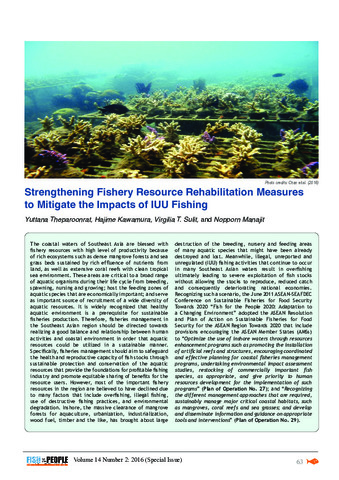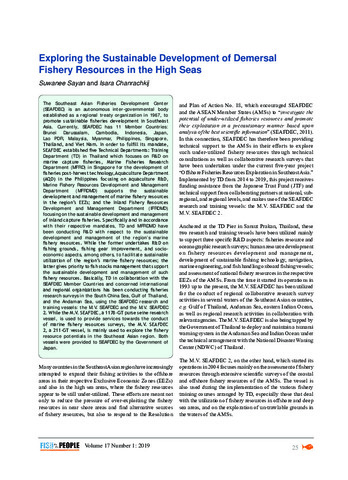Strengthening fishery resource rehabilitation measures to mitigate the impacts of IUU fishing
Share
Abstract
The coastal waters of Southeast Asia are blessed with fishery resources with high level of productivity because of rich ecosystems such as dense mangrove forests and sea grass beds sustained by rich effluence of nutrients from land, as well as extensive coral reefs with clean tropical sea environment. These areas are critical to a broad range of aquatic organisms during their life cycle from breeding, spawning, nursing and growing; host the feeding zones of aquatic species that are economically important; and serve as important source of recruitment of a wide diversity of aquatic resources. It is widely recognized that healthy aquatic environment is a prerequisite for sustainable fisheries production. Therefore, fisheries management in the Southeast Asian region should be directed towards realizing a good balance and relationship between human activities and coastal environment in order that aquatic resources could be utilized in a sustainable manner. Specifically, fisheries management should aim to safeguard the health and reproductive capacity of fish stocks through sustainable protection and conservation of the aquatic resources that provide the foundations for profitable fishing industry and promote equitable sharing of benefits for the resource users. However, most of the important fishery resources in the region are believed to have declined due to many factors that include overfishing, illegal fishing, use of destructive fishing practices, and environmental degradation. Inshore, the massive clearance of mangrove forests for aquaculture, urbanization, industrialization, wood fuel, timber and the like, has brought about large destruction of the breeding, nursery and feeding areas of many aquatic species that might have been already destroyed and lost. Meanwhile, illegal, unreported and unregulated (IUU) fishing activities that continue to occur in many Southeast Asian waters result in overfishing ultimately leading to severe exploitation of fish stocks without allowing the stocks to reproduce, reduced catch and consequently deteriorating national economies. Recognizing such a scenario, the June 2011 ASEAN-SEAFDEC Conference on Sustainable Fisheries for Food Security Towards 2020 'Fish for the People 2020: Adaptation to a Changing Environment' adopted the ASEAN Resolution and Plan of Action on Sustainable Fisheries for Food Security for the ASEAN Region Towards 2020 that include provisions encouraging the ASEAN Member States (AMSs) to 'Optimize the use of inshore waters through resources enhancement programs such as promoting the installation of artificial reefs and structures, encouraging coordinated and effective planning for coastal fisheries management programs, undertaking environmental impact assessment studies, restocking of commercially important fish species, as appropriate, and give priority to human resources development for the implementation of such programs' (Plan of Operation No. 27); and 'Recognizing the different management approaches that are required, sustainably manage major critical coastal habitats, such as mangroves, coral reefs and sea grasses; and develop and disseminate information and guidance on appropriate tools and interventions.'
Suggested Citation
Theparoonrat, Y., Kawamura, H., Sulit, V. T., & Manajit, N. (2016). Strengthening fishery resource rehabilitation measures to mitigate the impacts of IUU fishing. Fish for the People , 14(2), 63-75. http://hdl.handle.net/20.500.12066/986
Subject
Collections
Related items
Showing items related by title, author, creator and subject.
-
Status of Fishing Conditions in Cambodia
Sour, Kim; Vuthy, Ros (Training Department, Southeast Asian Fisheries Development Center, 1997)Fisheries in plays a very important role in Cambodia’s national economic development. Total fish catch production in 1996 was 104 310 tones, about which 60% was contributed by inland capture fisheries, 30% by marine capture ... -
Exploring the sustainable development of demersal fishery resources in the high seas
Sayan, Suwanee; Chanrachkij, Isara (Secretariat, Southeast Asian Fisheries Development Center, 2019)The Southeast Asian Fisheries Development Center (SEAFDEC) is an autonomous inter-governmental body established as a regional treaty organization in 1967, to promote sustainable fisheries development in Southeast Asia. ... -
The Status of Fisheries in the Republic of Maldives
Faiz, Mohamed (Training Department, Southeast Asian Fisheries Development Center, 1997)The paper discusses the tuna fisheries in Maldives which dominates its fishing industry. Apart from a very strong domestic market, tuna is also the main export commodity of the country. Moreover, reef fisheries such as, ...





